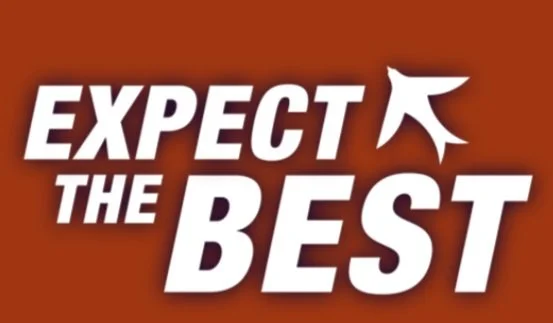Expect the best
My wife Naomi and I love to read books, and though sometimes it feels as if there is not time for it, we often make it a point to encourage one another by sharing what we’re learning from the books we’re reading. The truth is that we all make time for the things that are important to us. I’ve recently been reading a book called “What He Must be if He Wants to Marry My Daughter” on being “dad” to girls and how to best lead them and prepare them as the grow up and prepare for adulthood. I have been challenged and inspired to be a better dad. Naomi has recently been going through a book called “Don’t Mom alone” that has been really helpful for her as a mom to 5 kids. I always appreciate hearing what she’s learning, and though it seems simple, I think that this is something that often goes overlooked. Sharing with one another new ideas that we’re reading/hearing and working through them together - this is the crux of learning. Due to our culture’s fascination with social media and screens of all kinds, the art of reading books has unfortunately gone by the wayside for most people.
How can I know what you’re learning from the books you’re reading if you’re not reading any books? And if you’re not reading books, what other ways are your proactively growing yourself and sharing that with others? Leaders are learners, right?
One of my favorite books on leadership is a business fable titled the Heart of Leadership by Mark Miller – I’d like to share what I have learned from this book with you. In his book, Miller uses the word HEART as an acronym to explain leadership principles. The E in HEART stands for “Expect the Best.” I don’t recall how many years ago it was that I first read this book, but it was probably almost 10 years ago when I first came across it, the HEART acronym has stuck with me ever since. Each letter of the acronym represents a great principle, but if I had to pick the most meaningful principle for me, E for Expect the best”, is it.
So what does “expect the best” mean practically for us as leaders of a business, leaders in our homes, or in relationships with others? Here’s a couple of ways how I think the principle applies, based on my own experience.
As a leader, to expect the best first means that we optimistically hope for the best in all situations, even when our past experiences with people might inform us otherwise. When leading others, this takes courage. Far too often, we write people off in our minds, thinking they will never change. And because we write them off in our minds, we don’t give them room or opportunity to change. We wrongly assume because they’ve acted a certain way in the past that they will always act that way.
Just stop and think about that for a moment. What if people never gave you the chance to outgrow any of your mistakes? What if you mistreated somebody, felt sorry for it, and wanted to change, but they never showed you enough grace even to let you show how you truly felt. Leaders have to go first in making peace with others.
Often times people ask the question, if you were only able to pick only one book of the Bible to keep with you forever, which book would it be? For me it would be the book of Romans in the New Testament. Romans Chapter 12, in particular is one of my very favorite chapters in all the Bible – I encourage you to take a moment and read it if you haven’t. Near the end of the chapter, you’ll find verse 18 which says, “If possible, so far as it depends on you, be at peace with all men.” This is a verse that has greatly impacted me over the years. Though we can’t control how others respond to us, this verse does put the responsibility on us to actively seek out peace with all people. Being “at peace with all men” is not a passive command. It is a directive, a command that is expected to have action that follows. As a leader, you can’t just hope people don’t have a problem with you, and you can’t just hope that all problems will go away with time. This verse is telling us we need to actively seek out peace.
Secondly, don’t fall into the trap of operating with “Quid pro quo” respect. Often times leaders and people will operate in this way, though they would never admit it. The idea is this… “Well, I’ll give them the respect that they want, when I feel they’ve respected me the way I want. Or, “I’m not going to respect them, because they don’t respect me.” Now, I’m not advocating that when people mistreat you that you just brush it off like it didn’t happen. To "expect the best” in a situation like this means that you continually seek out what’s best for that person, even if they don’t seek out what’s best for you. To expect the best doesn’t mean to forget what happened, but to forgive what happened so that the people on the teams you lead have the grace to grow and learn from their mistakes.
Lastly, to “expect the best” means to proactively encourage people to reach their full potential. It means that we don’t just not hold others back, but we proactively look for ways to help people soar. To see their potential before they see it, to paint a picture for them of what their performance and what their life could look like if they stepped into their full potential. This is such a crucial role for a leader. Expect the best so that others can achieve a future and dreams that they otherwise would not have been able to without you. Great leaders help those under them dream and reach for more, and guide them along the way. Hasn’t someone done this for you? Would you be where you are today without someone pushing (or pulling) you beyond where you thought you could be?
What’s stopping you from being the change agent in the lives of those you lead?
“Expect the Best” is more than just a phrase, it’s a mindset. I challenge you to think about your own mindset…. And how will you implement the “Expect the Best” principle into how you lead?

